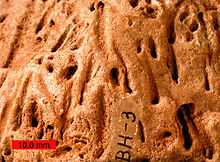Skolithos

Skolithos (formerly spelt Scolithus or Skolithus[1]) is a common trace fossil ichnogenus whose original form consisted of approximately vertical cylinders. One well-known occurrence of Cambrian trace fossils is the famous 'Pipe Rock' of northwest Scotland. The 'pipes' that give the rock its name are closely packed straight tubes, which in this case were presumably made by a worm-like organism. The name given to this type of tube or burrow is Skolithos, which may be 35 cm[2] (14") in length and between 2 to 5[2] cm (0.8 to 1.6") in diameter. Such traces are known worldwide from sands and sandstones deposited in shallow water environments, from the Cambrian Period (541 to 485.4 million years ago) onwards. Skolithos burrows have rarely been described from carbonates.[3] Some burrows have a helical form.[4] Skolithos is typically marine,[5] but is also known from freshwater lacustrine settings.[2] It is usually associated with high-energy environments close to the shoreline.[6] Trypanites is a similar form but is excavated in hard substrates as a trace fossil. Also related are Ophiomorpha and Diplocraterion.
References
- ↑ Gevers, T.W.; Frakes, L.A.; Edwards, L.N.; Marzolf, J.E. (1971). "Trace Fossils in the Lower Beacon Sediments (Devonian), Darwin Mountains, Southern Victoria Land, Antarctica". Journal of Paleontology 45 (1): 81–94. JSTOR 1302754.
- ↑ 2.0 2.1 2.2 Woolfe, K.J. (1990). "Trace fossils as paleoenvironmental indicators in the Taylor Group (Devonian) of Antarctica". Palaeogeography, Palaeoclimatology, Palaeoecology 80 (3–4): 301–310. doi:10.1016/0031-0182(90)90139-X.
- ↑ Vinn, O.; Wilson, M.A. (2013). "An event bed with abundant Skolithos burrows from the late Pridoli (Silurian) of Saaremaa (Estonia)". Carnets de Géologie. CG2013_L02: 83–87. doi:10.4267/2042/49316. Retrieved 2013-04-04.
- ↑ E. Volohonskya, M. Wisshakc, D. Blomeierb, A. Seilachera, S. Snigirevskyd and A. Freiwaldc (2008). "A new helical trace fossil from the Lower Devonian of Spitsbergen (Svalbard) and its palaeoenvironmental significance". Palaeogeography, Palaeoclimatology, Palaeoecology 267: 17. doi:10.1016/j.palaeo.2008.04.011.
- ↑ Trewin, N.H.; McNamara, K.J. (1995). "Arthropods invade the land: trace fossils and palaeoenvironments of the Tumblagooda Sandstone (? late Silurian) of Kalbarri, Western Australia". Transactions of the Royal Society of Edinburgh: Earth Sciences 85: 177–210. doi:10.1017/s026359330000359x.
- ↑ Desjardins, P. R.; Gabriela MÁngano, M.; Buatois, L. A.; Pratt, B. R. (2010). "Skolithospipe rock and associated ichnofabrics from the southern Rocky Mountains, Canada: colonization trends and environmental controls in an early Cambrian sand-sheet complex". Lethaia 43 (4): 507. doi:10.1111/j.1502-3931.2009.00214.x.
External links
-
 "Scolithus". The American Cyclopædia. 1879.
"Scolithus". The American Cyclopædia. 1879.